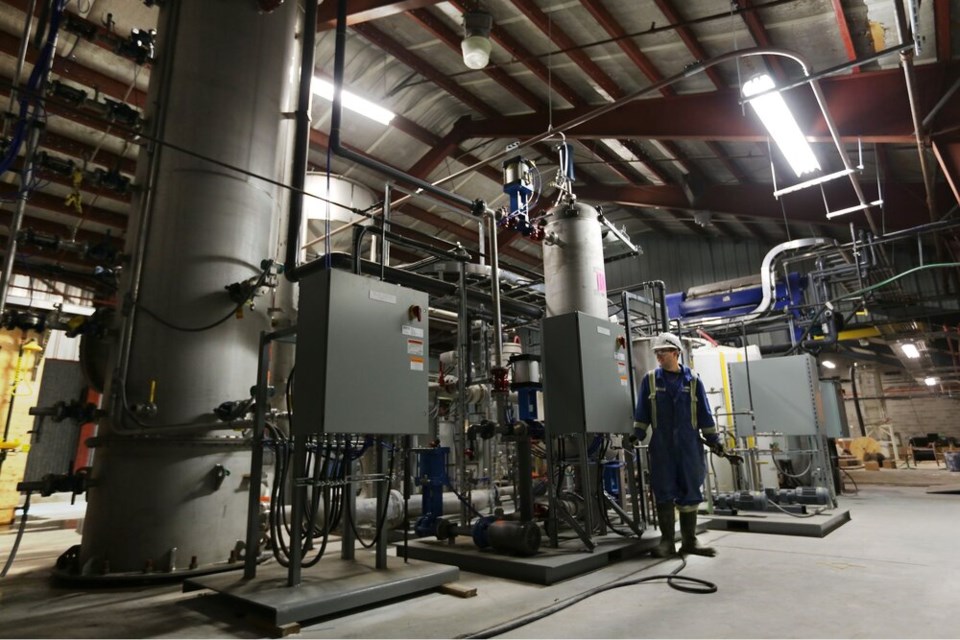Natural Resources Canada is funding five B.C. cleantech companies and projects to the tune of $12.5 million, including $5 million for Carbon Engineering’s direct air carbon capture technology and close to $1 million for a biofuel project at the Parkland refinery in Burnaby.
The funding comes from NRCan’s energy innovation program.
Carbon Engineering is the largest recipient of the funding. The company, a subsidiary of Occidental Petroleum (NYSE:OXY), which bought the Squamish-based company last year for $1.5 billion, pioneered direct air capture – a process for removing CO2 from the atmosphere and turning it into a solid. The captured CO2 can be used as feedstock to make low-carbon fuels, such as jet fuel, or for enhanced oil recovery.
Because CO2 in the atmosphere is so diffuse – making up just 0.04 per cent of the atmosphere – direct air capture necessarily requires sucking a lot of air through absorption filters, which is highly energy intensive. And if the electricity used to power it comes from coal or natural gas power, it can defeat the whole purpose of carbon capture.
The funding from NRCan will be used by Carbon Engineering to develop alternative energy sources to power DAC.
“DAC systems tend to be very energy intensive, and in order to make the kind of contributions that the potential is there to fighting climate change, you can’t be using fossil fuels to actually provide the energy for the air separation,” Natural Resources Minister Jonathan Wilkinson told BIV News. “This is about them looking at a range of different options for alternative energy solutions and trialing them as part of ensuring the overall economics can actually work.”
Another carbon sequestering technology company receiving NRCan funding is Arca Climate Technologies, which developed a mineral activation process for sequestering CO2 in mine tailings.
Certain types of rock naturally absorb CO2 through mineralization. But it’s a very slow process. Arca’s technology speeds that natural process up, with mine sites being ideal for the process, since they have an abundance of crushed rock on site.
Parkland Corp. (TSX:PKI) will receive $980,500 for its biofuel processing. Parkland uses feedstocks such as canola oil and oil derived from animal fats and to make biofuels, which are blended with diesel to make biodiesel to reduce its carbon intensity.
Calculating just how much CO2 is avoided through blending biofuels with fossil fuels can be a challenge, however. The funding it will get from NRCan is intended to improve the validation process.
“A lot of the work is actually being able to track the biogenic carbon and really to be able to validate the carbon intensities of fuels that are co-processed,” Wilkinson said. “So it’s going to give them the ability to be more precise with respect to the carbon intensity of the fuels they’re producing.”
Two of the projects receiving funding are related to reducing the carbon intensities of pulp and paper making.
Highbury Energy is receiving $710,000 for a project aimed at replacing natural gas used at the Cariboo Pulp and Paper Mill in Quesnel with renewable fuel gas. Highbury’s dual fluidized bed steam gasifier process extracts hydrogen, carbon monoxide and methane from waste woody biomass to produce low-carbon gas.
The University of BC is getting $1.5 million to develop a process for removing CO2 produced in pulp and paper mills using biproducts produced in the pulp and paper making process.
BC Biocarbon, based in McBride, B.C., is getting $2.5 million to advance a process of turning municipal waste into biocoal for the cement industry. When biocoal is used to replace fossil fuels in the cement making process, it is considered carbon neutral.
"The reason why we're providing these funds is this is actually building the economy of the future," Wilkinson said. "B.C. has been a cleantech leader for many years. This is actually about continuing to grow that sector and create good jobs."



